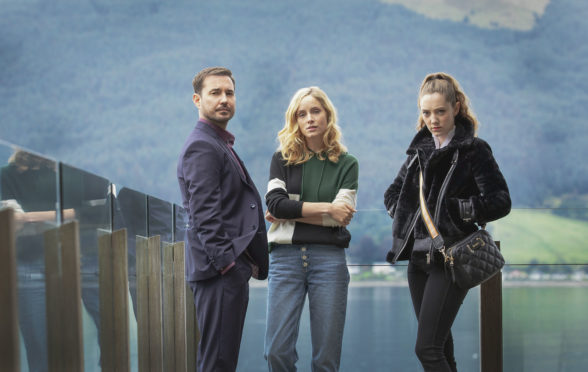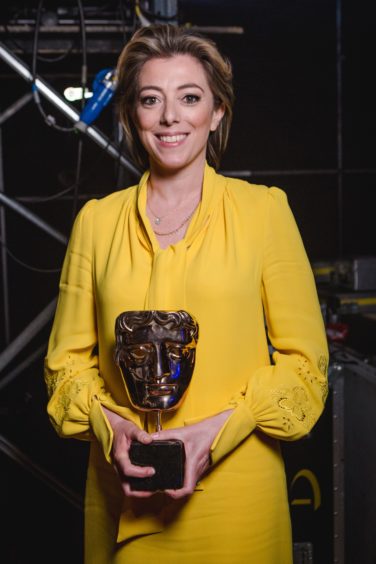
Bafta-winning screenwriter Nicole Taylor is such a big fan of Martin Compston she wrote her latest TV series for him.
The Glaswegian writer behind acclaimed BBC dramas The C Word and Three Girls, and last year’s big-screen success Wild Rose has penned highly-anticipated thriller The Nest.
The twisty five-parter, which is described as domestic noir, stars Line Of Duty’s Compston and Peaky Blinders’ Sophie Rundle as a rich couple so desperate for a child that they pay a troubled teenager to be their surrogate.
“I wrote it for Martin, intending for him to be his Greenock self and for it to be set in Glasgow,” Nicole explained.
“I don’t usually do that, because you can never guarantee someone’s availability or that they’ll be up for it, but I’ve loved Martin since his debut in Sweet Sixteen.
“It was a bittersweet thing for me when he became so big with Line Of Duty.
“I liken it to being really into a band that not everyone knows about and then they become really well known.
“But he deserves it because he’s an amazing actor and I thought, you ain’t seen nothing yet, because you haven’t heard him with his true accent, so I was determined to write this for him.
“When the character popped into my head, I knew it was him.
“He read the script in two hours and agreed to do it, which was an amazing moment.
“I’m really proud of the cast and I’m so interested to hear what people think of him in the role.
“I’ve already seen a few comments on Twitter based on the trailer, people talking about his accent and saying it’s fake and not very good. He revels in that sort of thing.”
Also serving as inspiration was what Nicole was going through in her own life.
“I always like to write about things I’m afraid of, and I was thinking about getting pregnant but I was afraid of it and ambivalent about it.
“That’s one of the glories of writing for me, getting to think about and explore what’s on my mind through made-up characters.
“I wasn’t pregnant when I started but was heavily pregnant by the end, and I had that condition Kate Middleton had – hyperemesis – where you’re just boaking all the time, which is terrible, while trying to get this finished.
“She was born after the show had gone into production, so I didn’t get to be on set – which I normally like to do – but it was due to a good cause.”
The Nest also stars newcomer Mirren Mack, alongside veterans Shirley Henderson, James Harkness, David Hayman and Kate Dickie.
“The idea felt very plausible,” Nicole continued. “A middle-class woman, desperate for a baby, who might actually think, through her desperation, that it’s a good idea to effectively hire a poorer woman to carry a baby for her, especially if the middle-class woman has had a lot of grief and is in a bad place.
“It was a way to explore some interesting themes, like social mobility, inequality and the perils of technology.
“Ultimately, though, it’s a thriller that leaves you wondering what will happen next.”
The success of Nicole’s first film, Wild Rose, last year was a personal triumph for the Glaswegian.
The story of a single mum from the city who wanted to become a country music star was an idea that had been gestating in Nicole’s mind for years.
She said: “The way it was received in Scotland especially was maybe the most important thing. For me, it stood or fell on how Glaswegians would take it.
“My mum used to go to the cinema to see it regularly and would tell me how people broke out in applause. That made me feel amazing.”
The success of Wild Rose at the box office was replicated by 1917, another film written by a female Scottish screenwriter.
The parallels between Nicole and 1917’s Krysty Wilson-Cairns’s lives and careers are such that they have now become good friends.
“A couple of years ago, people down here in London started asking me if I knew this girl, that we had the same accent, and eventually we were introduced,” Nicole explained.
“We got on so well and talked for hours. We realised we went to the same school – Craigholme – in Glasgow.
“Krysty is 10 years younger than me but we were both inspired by the same English teacher, Mrs Longmuir. She was one of those teachers they make films about – a really inspiring, amazing woman – and we each credit her with a lot.
“Mrs Longmuir saw something in me I didn’t see in myself. She made me see a whole world out there and told me I could write and should apply for university.
“She really saw past the person I was at 14 and we still keep in touch, writing letters and emails to each other for more than 20 years.
“Unfortunately the secondary school has closed now, so Krysty and I joke we won’t be able to go back and give a careers talk, but it’s great to know her and to have a laugh about old stuff from home.”
The Nest, BBC1, Sunday, 9pm

Enjoy the convenience of having The Sunday Post delivered as a digital ePaper straight to your smartphone, tablet or computer.
Subscribe for only £5.49 a month and enjoy all the benefits of the printed paper as a digital replica.
Subscribe © Jonny Birch/BAFTA/Shutterstock
© Jonny Birch/BAFTA/Shutterstock